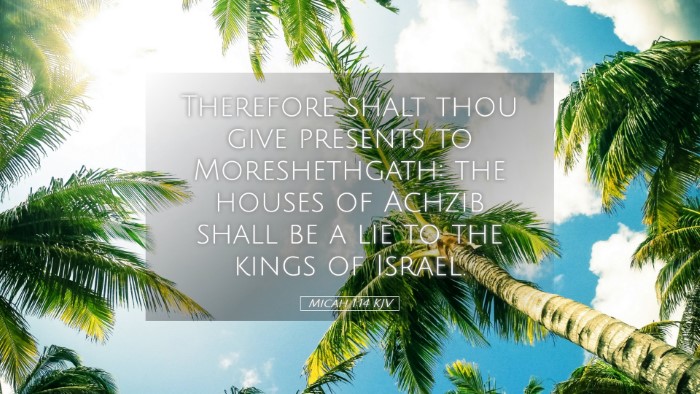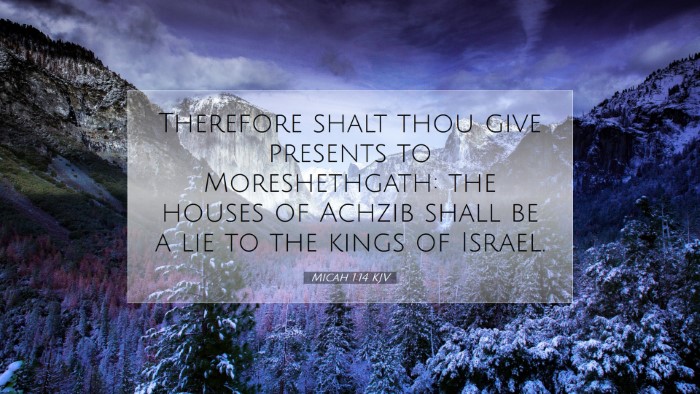Old Testament
Genesis Exodus Leviticus Numbers Deuteronomy Joshua Judges Ruth 1 Samuel 2 Samuel 1 Kings 2 Kings 1 Chronicles 2 Chronicles Ezra Nehemiah Esther Job Psalms Proverbs Ecclesiastes Song of Solomon Isaiah Jeremiah Lamentations Ezekiel Daniel Hosea Joel Amos Obadiah Jonah Micah Nahum Habakkuk Zephaniah Haggai Zechariah MalachiMicah 1:14
Micah 1:14 KJV
Therefore shalt thou give presents to Moreshethgath: the houses of Achzib shall be a lie to the kings of Israel.
Micah 1:14 Bible Commentary
Bible Commentary on Micah 1:14
Verse (Micah 1:14): "Therefore shalt thou give presents to Moresheth-gath: the houses of Achzib shall be a lie to the kings of Israel."
Contextual Overview
The Book of Micah is a profound and poignant prophetic work that addresses the moral and social decay of Israel and Judah. Micah prophesied during a time when the northern kingdom of Israel was succumbing to idolatry and injustice, which ultimately led to its downfall. His messages serve as a dire warning and a call to repentance.
Analysis of Micah 1:14
This verse, like many in the prophetic literature, uses vivid imagery and symbols to convey spiritual truths. Each element presents insights that resonate with contemporary implications.
The Significance of Moresheth-gath
Moresheth-gath is significant for a few reasons. It is Micah’s hometown and could symbolize the humbling of mighty powers. By naming his own town, Micah brings a personal touch to his prophecy, evoking a sense of loss and foreboding. Albert Barnes notes that Moresheth-gath would become a place where gifts are brought, signifying submission or an offering to a superior force. This suggests the eventual subjugation of Israel due to its sins.
The Houses of Achzib
Similarly, the reference to the houses of Achzib illustrates the theme of false trust. Achzib, which means "deceitful," represents cities or places that falsely promise safety and security. Matthew Henry comments that these "houses" would betray their inhabitants and not provide refuge. Instead of aiding the kings, they become a proverbial lie—a reminder that earthly security is transient and unreliable.
Presenting Gifts to Moresheth-gath
The act of giving presents suggests an acknowledgment of defeat and capitulation. The prophetic imagery reflects a future where Israel’s own resources and dignity are stripped away, leading them to pay tribute to their enemies. Adam Clarke highlights that this verse underscores the loss of autonomy and the stark reality of divine judgment for their transgressions.
Theological Implications
This verse serves as a sobering reminder of God's judgment and the consequences of sin. It warns leadership and the people of the severe repercussions of straying from God’s covenant. It emphasizes the need for repentance, both personally and collectively, resonating deeply within ecclesiastical and theological discussions today.
God's Sovereignty
Underlying this verse is the theme of God's sovereignty, where He utilizes even the downfall of nations for His divine purposes. The impending judgment that Micah proclaims is not arbitrary; it is a response to Israel’s blatant idolatry and immorality. This highlights the relationship between divine justice and mercy—a recurring motif in prophetic literature.
Implications for Contemporary Believers
For pastors and theologians, Micah 1:14 provokes critical reflections on reliance upon worldly systems and highlights the ultimate futility of seeking refuge outside of God. It calls for vigilance against the subtle encroachments of sin, whether within individual lives or the corporate church congregation. The commentary encourages the faithful to examine the 'Achzibs' in their lives—those deceptive comforts that lead them away from true reliance on God.
Conclusion
In sum, Micah 1:14 resonates through the ages, inviting believers to consider the implications of trust, security, and the harsh realities of divine judgment. The reflections offered in this commentary serve as both a warning and a call to a deeper faithfulness to God—encouraging all to return to the fundamental truths of dependence upon Him, particularly in a culture that often prioritizes transitory values.


